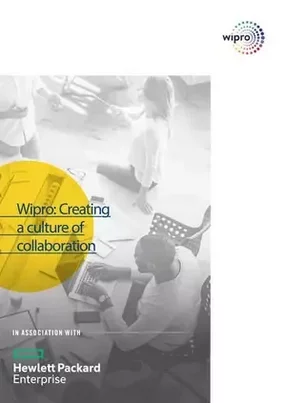Wipro’s Mahesh Raja on creating an open innovation culture in financial services
Adapting long-held business models to the irrepressible forces of change is, right now, the critical challenge facing our most prestigious financial institutions. Never before has the established order had to contend with such genuine threats to its dominance. While undoubtedly a priority for leaders across industries, the next stage of evolution for the financial sector is especially unpredictable as a system, impenetrable for so long, opens up slowly to different methods, ideas and thinking.
Technology has been the catalyst for that change. Decision-makers have no choice but to find answers to questions such as ‘how can we use advanced AI and machine learning to predict the future?’, ‘should we move our entire systems to the cloud?’ and ‘what is in place to shield our information from cyberattacks?’.
Implementing transformative tools within business structures that have grown over decades is a slow process, however – and this is why start-ups, challengers and fin-techs, free from historical baggage and practices, have been able to steal a march on their once-uncatchable rivals.
Mahesh Raja, VP, Financial Services - Americas, Wipro Limited is leading a small group aiming to bridge the gap between the United States’ most recognized entities and the disruptive outsiders offering alternatives to the status quo. He believes that, through the development of Wipro’s ‘New-Age Financial Services’ ecosystem, the building blocks are in place to forge the industry’s future.
Wipro’s footprint in financial services
Wipro is one of the foremost technology service providers the world over. A significant influence with fingerprints on just about every industry, it is a global leader in the fields of IT, consultancy and the changing of business processes through the use of advanced and emerging technologies.
The company generates approximately over $8bn of revenue annually, with 30% of this figure earned in the financial services sector, encompassing not only the banking world but also insurance and capital markets.
Wipro’s Americas region – covering the United States, Canada and Latin America – is its core market for financial services, bringing in a significant portion on its own each year. Specialising in digital transformation, customer experience, application engineering and infrastructure and business operation services, Wipro’s Americas region engages numerous high-profile clients, including some of the largest banks in the US.
Firmly established within that sphere, Mahesh’s ‘New-Age Financial Services’ initiative represents something more adventurous as it looks to encourage collaboration between players at the opposite ends of the spectrum.
“We started this group within Wipro after asking ourselves this: what if our existing clients, where we have made a significant chunk of our revenue, don't exist in 10-15 years’ time – what is going to happen to them?” he explains. “The traditional banks and financial institutions are getting disrupted by new-age platform companies, whether they like it or not.
“Builders of innovation, both on the business model side and the operations side, are driven by innovative technologies and some of our incumbent clients need to adapt to these tech-driven changes.
“Embracing innovation from the outside - from start-ups and fintechs – is essential for them and is also for companies like us. While these start-ups might be small and may not even meet our threshold of being a client today, in a few years they will be the next unicorns.
“That’s the broad genesis of what we thought about when we set up the new ecosystem. Wipro's part in that is to build a strategic partnership between the established companies and the start-ups. We understand the industry domain; we focus on technology and can enable organizations as small as a fintech to scale up, leveraging our relationship with the larger financial institutions.”
A new-age ecosystem
The importance of Mahesh’s project to Wipro’s future vision can be reflected in the fact that, two years ago, he was given his remit from the very top. Working under the guidance of the company’s Chief Executive Officer & Executive Director – Abidali Z. Neemuchwala, and with strategic direction from President & Global Head, BFSI – Shaji Farooq, he has built a cluster team made up of key personnel based in Silicon Valley, New York, Bangalore and London.
‘New-Age Financial Services’ encourages a two-way street of collaboration between client and start-up, with the end goal of improving operations for both parties. For the client, welcoming a start-up’s ideas is a way of accelerating its own innovation, keeping it ahead of the competition. For the smaller firm, a relationship opens doors to resources, customers and funding.
By creating what Mahesh refers to as a ‘360-degree’ partnership ecosystem, Wipro is able to provide the balance in momentum between a larger organization’s execution and the impetus of a start-up through an agile ‘right model’ delivery process.
“A start-up operates at a very high velocity but a client organization operates not even close to that, so the question is how we bridge that gap,” he says. “Firstly, Wipro comes in. Then we help these fintechs or start-ups find the right stakeholders to navigate large organization complexities.”
“For example, if they have a unique asset in any business process area, how do you take an asset or platform to a larger organization? And how do you identify those stakeholders who'll be interested in assimilating that into the larger organizations?”
“Thirdly, we assist our clients in their transformation journey more holistically. For example, we don't just look at one business process – we look at everything from an end-to-end perspective and say, look, if you're reimagining your model into this process, this is actually how we help you with your time-to-market. If you build it, it will probably take four years. If we can partner in this new-age ecosystem, we can actually do it in four months.”
Embracing outside innovation is now becoming a vital strategic approach for the most successful companies as they seek out external partners for sourcing ideas, commercialization and expansion into adjacent business and new segments. According to Raja, ‘entire corporate strategies are predicated on a networked model’ – but it’s a model that doesn’t come without obstacles.
Challenges with collaboration
For Mahesh, the most common issue to contend with is what has become referred to as ‘Not Invented Here Syndrome’, or ‘NIHS’. Larger organizations often harbour cultures steeped in NIHS, instinctively reacting negatively to ideas and concepts from an external source.
“This syndrome is pretty common in many large enterprises,” he notes. “This is where Wipro comes in and says, ‘Hey, let us help you embrace some of these outside innovations and bring it in house for you to see if it works.”
Secondly, Mahesh believes start-ups are often too narrow in their focus when compared with the broad digital transformation agendas set by the CEOs and other C-level executives of larger organizations. Additionally, he observes that smaller operations tend to lack the deep domain knowledge in areas of compliance and legality while also falling short in the resource to focus on long-term solution viability.
“These barriers affect the success of the collaboration between established companies and start-ups,” he adds. “Start-ups also find it difficult to navigate the vast corporate structures and processes of the established companies to reach the right audience for the solutions that they have.
See also:
- Infomart Data Centers delivers agile, customer-focused digital solutions
- How University of Malaya is creating a smart campus with its trailblazing digital transformation
- FWD Insurance: disrupting the insurance industry in Thailand
“For lack of a better term, Wipro is trying to be a partner, helping to bring these fears into the same ecosystem by trying the ‘balance’ option. We have deep experience in working with complex organization structures and satisfying the stringent requirement of these functions.”
“We also have a lot of domain and functional experience and expertise that has been built over a long period of association with our clients. We are able to constantly assess and understand the implication and complexities that result from running real world businesses. This helps start-ups adapt their solutions to these needs.”
An open innovation pathway
Wipro has evaluated more than 1,200+ new-age businesses as part of the project, but with current manpower it has elected to focus on a handful of promising assets in the fields of business model innovations, cognitive artificial intelligence and machine-learning; technologies that have proven the most disruptive for its major clients.
Wipro has partnered with three companies in that specific space (AI/ Cognitive), each of which has developed a unique business model and platform with the potential to transform processes across the sector. Additionally, it is working with challenger banks in North America, Europe and Latin America, on top of a major project with a large bank with operations in two continents.
With a dearth of competition in this area, Wipro believes it has a serious opportunity to broaden its horizons and exist at the centre of a new era of open innovation in financial services.
“The way we are looking at the new-age ecosystem is not that it's going to make the next $100mn or $500mn for us but that we are starting to work with those companies, which we have never worked with in the past,” concludes Raja. “From our perspective, we have to start operating and thinking like these new-age companies because the way we need to service them is very different. They're really nimble, really agile and very rapid.”
“I think it's a significant differentiator for us as a company and we believe this will be a wedge into the marketplace, especially with some of the propositions we are having with our current customers. It is a real opportunity for Wipro.”

- Dell at 40: A Long-Standing Commitment to Digital InnovationDigital Transformation
- Top 100 Women 2024: Tanja Rueckert, Bosch - No. 6Digital Transformation
- Coforge: Arming Financial Firms with the Tools to InnovateDigital Transformation
- Coforge: Arming Financial Firms with the Tools to InnovateDigital Transformation

